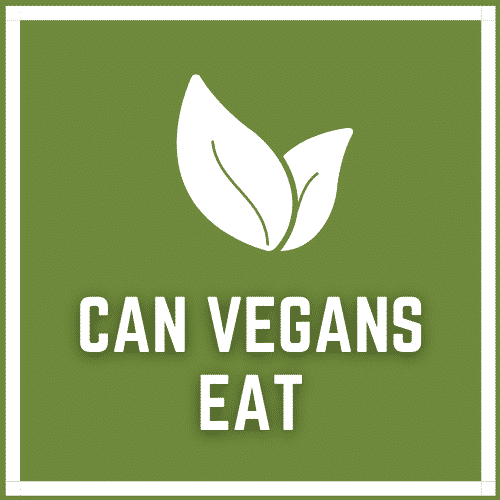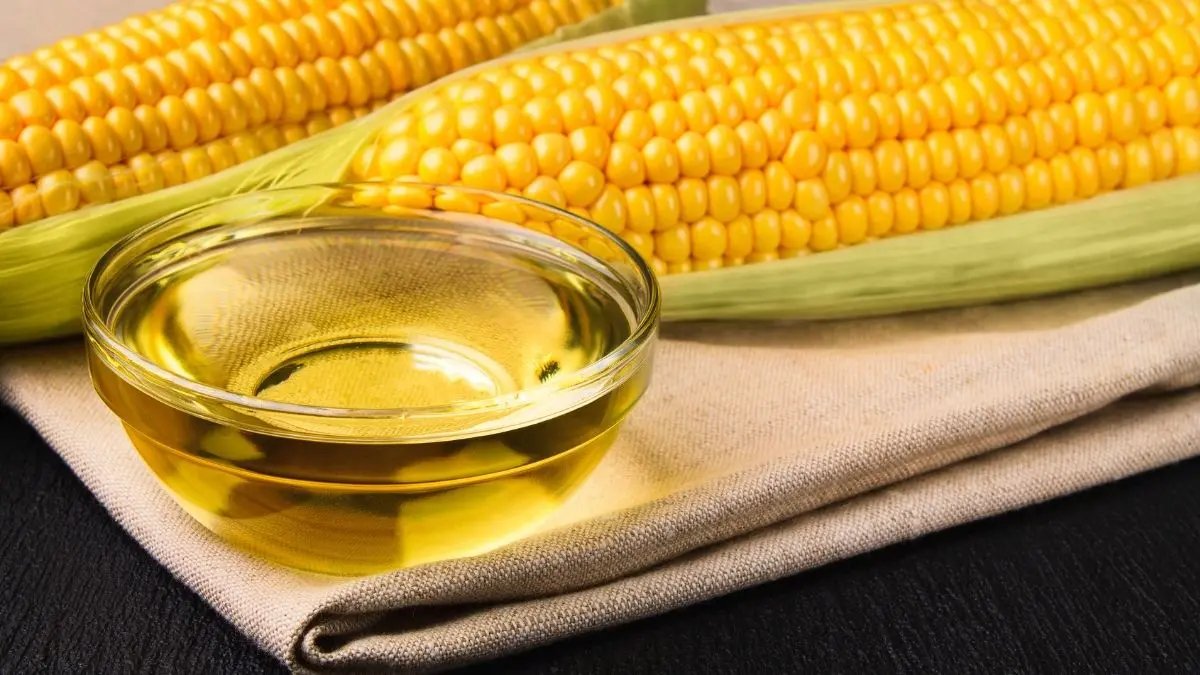Answer: Yes.

Corn oil is vegan. It’s simply an extracted vegetable oil from the corn germ.
However, corn oil goes through a complex refining process and loses many of its vitamins and minerals. Most vegans try to avoid it because of the production process and because it’s genetically modified (GMO).
In this article, we will learn more about corn oil, its uses, its health benefits, and how harmful it can be to the environment.
Table of Contents
What Is Corn Oil?
Also known as maize, corn germ goes through a refined extraction process. Corn oil is mostly used in deep-frying and making margarine, cosmetics, or for industrial purposes.
What makes it ideal for deep-frying is the high smoke point of around 450°F. This oil also makes a good ingredient in salad dressings, marinades, bread, cakes, sautéing, and more.
Corn or maize was first grown in the south of Mexico around 10,000 years ago. The six types of maize include flint corn, dent corn, popcorn, pod corn, waxy corn, sweet corn, and flour corn. All these are key ingredients in making many different dishes, which have been a staple to food culture around the world.
How Is Corn Oil Produced?
About 90% of corn production, even in the U.S., requires pesticides for them to survive. This production is genetically modified, meaning the pesticides endanger the surroundings. These pesticides produce chemicals that contaminate the soil, air, water, and plants.
Corn has only about 4% of fat content, so it must go through extensive oil extraction. The corn kernels have to be mechanically pressed for oil separation. The oil then goes through different processes, such as hexane extraction, deodorization, and winterization, to successfully produce corn oil.
Hexane Extraction
Hexane is a chemical used to extract oil from corn, which is known for its negative impact on the human nervous system and animals when inhaled excessively. It may cause headaches, dizziness, nausea, and giddiness.
Deodorization
When hexane extraction is done, corn oil becomes unsuitable for cooking due to its smell and taste. This is when the deodorization process takes place to remove the impurities. However, some healthy compounds, including vitamins and minerals, go down the drain.
Winterization
Winterization is needed to keep corn oil in its liquid form. Otherwise, it solidifies in cold temperatures. This process removes the solid waxes and saturated fats from the oil through steam distillation so it can remain liquid even in low temperatures.
Is Corn Oil Healthy?
Corn oil contains no carbs or proteins and is 100% fat. It loses many vitamins and minerals during the extraction process, but it still provides a good amount of vitamin E, which is loaded with antioxidants.
Antioxidants help neutralize high levels of free radicals that cause some types of cancer, heart diseases, and type 2 diabetes. Because it’s vegetable oil, it’s also packed with about 60% of polyunsaturated fats that are rich in omega-6 and omega-3. This means that corn oil is anti-inflammatory.
However, when omega-6 is consumed excessively, it may cause heart disease, obesity, depression, and brain function issues. This is why experts highly recommend balancing your omega-6 and omega-3 fats intake to improve health stability.
About 15 ml of corn oil or one tablespoon contains 122 calories, 14 g of fat, and 13% of vitamin E of the Reference Daily Intake (RDI).
Compared to other vegetable oils, corn oil is high in phytosterol beta-sitosterol, which may possess anti-tumor properties. In a study, beta-sitosterol slowed down the spread of lung cancer cells without harming healthy lung cells.
Phytosterols are also helpful in blocking your body’s cholesterol absorption. This can help decrease your LDL cholesterol levels and promote heart health.
Environmental Impact
While corn oil is vegan-friendly, many vegans avoid using it because of its negative environmental impact. Most corn oil is made from genetically modified corn, making it insect resistant.
A herbicide called glyphosate is used as a weed killer before planting corn. In 2018, the Food and Drug Administration released test data where more than 60% of corn samples showed glyphosate content.
For decades, the use of glyphosate was considered safe. However, concerns about the weed killer’s direct and indirect health effects have increased in recent years. The World Health Organization (WHO), in 2015, reclassified glyphosate as a probable carcinogen.
Corn, as genetically modified, can survive the pesticides used except the other plants, animals, and soil. It exhausts the natural nutrients and nitrogen from the soil, which makes corn oil unsustainable and harmful to wildlife and the ecosystem.
Environmentally-Friendly Cooking Oils
Whether you love cooking or not, cooking oil is already a staple in everyone’s kitchen. But unknowingly, we sometimes bring in unsustainable ones. As vegans, we mustn’t just consume any animal byproducts but also help protect the environment.
With that being said, we gathered the most sustainable vegan cooking oils that are a must-have in your kitchen. Take note that for as long as you choose organically produced cooking oils, you’re helping everyone protect the ecosystem and wildlife.
- Olive Oil. The production of olive oil can also pose a danger to the environment if not well-taken care of. However, it’s way more sustainable than Corn Oil, especially since it can be produced organically. So, we highly recommend extra virgin olive oil brands like California Olive Ranch Everyday.
- Palm Oil. It’s one of the most sustainable vegetable oil you can have. There are many different organic brands that you can buy from your local grocery stores, like Botanical Beauty Organic Red Palm Fruit Oil and Folebe Oil 100% Pure Natural Red Palm Oil.
- Canola Oil. Extracted from the mustard rape plant, canola oil is also sustainable and healthy. You can get cold-pressed and organic brands like Simple Truth Organic Expeller Pressed Canola Oil.
- Sunflower Oil. The production of Sunflower Oil is also more sustainable. You may opt for organic brands such as Healthy Harvest Non-GMO Sunflower Oil.
- Coconut Oil. This is often praised as organic, which doesn’t require any pesticides. Check the brand Tropical Life for its organic coconut oil.
- Avocado Oil. While this may require deforestation due to its recent increased demands, there are still too many organic and cold-pressed brands that you can trust. Brands like Nutiva Organic Avocado Oil and Avohass Avocado Oil deserve a high five!
- Rice Bran Oil. Made from rice chaff, this also offers organic options such as Tophe’s Non-GMO Pure Rice Bran Oil and King Rice Bran Oil. These brands don’t use any pesticides that cause harmful effects on the environment.
- Sesame Oil. There is no known huge negative impact on the environment when it comes to sesame oil production. It’s sustainable if you buy organically produced organically, like Eden Extra Virgin Sesame Oil and Kevala Organic.
Organic And Cold-Pressed Corn Oil
Just like any other vegetable oil, corn oil also has an organic option known as maize oil that’s non-GMO, cold-pressed, and minimally processed. However, there’s not much organic production for corn oil, especially since it’s widely used for industrial purposes requiring extensive processes.
Nonetheless, there are ethical and sustainably produced corn oil brands that you can opt for. Check what we have on this list:
- Best of Hungary. It’s certified organic and cold-pressed. It’s also a winner of the Great Taste Award.
- Nature in Bottle. This is made in India and is 100% natural and cold-pressed.
- Corn Oil – Virgin Organic. Here’s another great option for sustainable corn oil. It’s USDA-certified organic and non-GMO.
- Health & Beauty. It’s cold-pressed and 100% all-natural, cruelty-free, and organic.
- RV Essential. It’s unrefined, 100% natural, and cold-pressed.
The Bottom Line
Corn oil might possess some health benefits, but corn production poses a danger to human and animal health and the ecosystem. Due to its excessive refining process, corn oil is considered unsustainable and not the best choice, especially for vegans.
If you are thinking of buying corn oil, you may look for organic brands. Finding one is a little challenging, but you can check Amazon or the supermarkets. Otherwise, you may choose other vegan and more sustainable cooking oils such as olive oil, coconut oil, avocado oil, and palm oil, among others.
Remember that vegans don’t just go for meat-free products but also those that have little to no negative impact on the environment.

